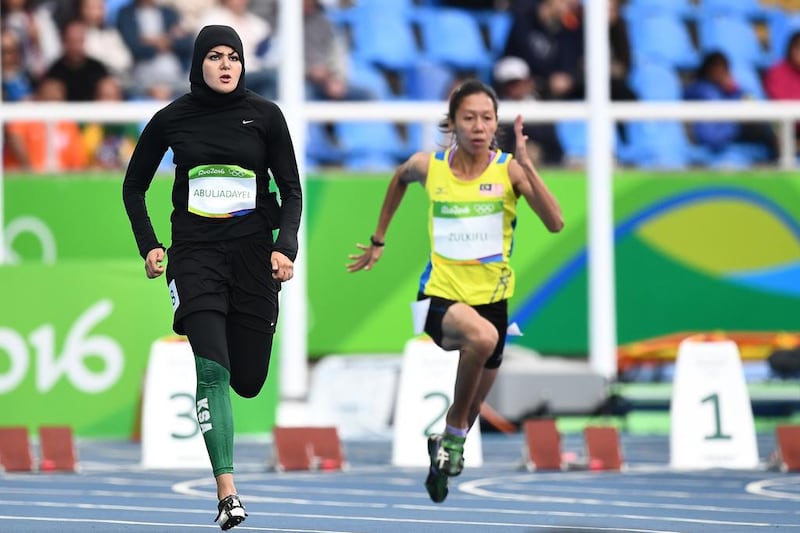The documentary Girl Rising, which has screened around the world, has served as an awareness campaign about the plight of poor and disadvantaged women. Among them is a stereotypical Afghan child bride – and the problem is that this kind of image sticks in the minds of people who don't know Muslims, and it creates fear and anxiety about Muslims.
To counter this, here have been narratives about women who break stereotypes, such as hijab-wearing American Olympic fencing bronze medallist Ibtihaj Muhammad. But, of course, there has also been the inevitable backlash.
“Using the language of 21st century human rights to defend 14th century-style oppression is ludicrous ... the ridiculous garb they are forced to wear in order to be able to compete is not a representation of freedom, but the symbol of the chains [that] shackle women,” Fox News commentator Adam Shaw wrote.
Doaa El Ghobashy, the Egyptian beach volleyball player, who also dressed modestly, says: “Who cares? I don’t.” Rightly so – but I keep thinking what effect all of this will have on the future of girls in sport in the Muslim world.
Still We Rise should be the title of the next conference on Muslim women and sport, since the "we can do anything a non-hijabi so-called liberal can do" approach is not working.
After Muhammad lost her second match, the Twitter hate was scathing. One post read: “Leave the country … you subhuman.”
Alhamduillah (praise to God) she didn’t.
Muhammad is ranked number two in the world of women's fencing. Like El Ghobashy and weightlifter Sara Ahmed, she is a champion in her own right.
But Aya Medany, a pentathlon athlete who represented Egypt in both the Athens and London Olympics, was banned from participating in swimming events by the International Swimming Federation because of her request to wear full body swim wear and head covering.
Discrimination against Muslim women and preventing them from participating in athletic pursuits can have a dangerous ripple effect in terms of future sport and fitness programmes for women and girls.
“When I first joined, I was the only hijabi. No one would pass me the ball, so I then lost all confidence and gave up,” says Ikra Ali, a former member of the Bradford University Women’s football team. Her second attempt at the sport was a success, yet she still faced slights from coaches who asked: “Do you really need to wear that thing on your head?”
This sort of discrimination can lead to Muslim women asking themselves: “Why try when, at the end, there will be impassable roadblocks?”
These include the International Basketball Federation's worldwide ban on the hijab that has denied American champion Bilqis Abdul Qaadir her dream to play professionally. It also caused the Qatari women’s basketball team to forfeit the 2014 Games. Hence there have been no hijab-wearing basketball Olympians this time around.
“I hate the hypocrisy. They say women should be free, but if your freedom includes hijab, then you are criticised and excluded,” one school administrator told me.
Could this be the reason there are very few government-supported school or community-based girls’ sports centres?
Participation in sport outside of school hours can be very expensive. Think of all of the talent that is out there but has no opportunity and support.
If we are seeing more hijabis in international sport, it is because somewhere a sporting committee has been forced to give in and allow the hijab.
It’s time that all international sports bodies realise that these Muslimahs are not going to take their hijabs off. Fame and gold are nice, but they can’t compare to Allah’s reward.
This is what is needed , just some more chances and visible role models. The number of hijab-wearing sportswomen is rising despite the bans and undeserving scrutiny of those so-called liberals who fear the hijab.
Maryam Ismail is a sociologist and teacher





